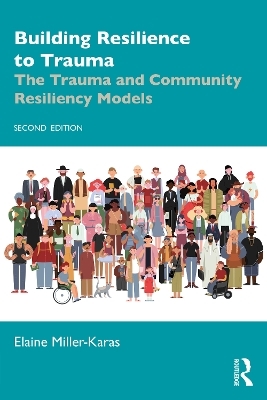
Building Resilience to Trauma
Routledge (Verlag)
978-0-367-68170-8 (ISBN)
During and after a traumatic experience, survivors experience a cascade of physical, emotional, cognitive, behavioral, relational, and spiritual responses that can make them feel unbalanced and threatened. The second edition of Building Resilience to Trauma explains common responses from a biological perspective, reframing the human experience from one of shame and pathology to one of hope and biology. Using two evidence-informed models of intervention that are trauma-informed and resiliency-informed—the Community Resiliency Model (CRM) and the Trauma Resiliency Model (TRM)—chapters distill complex neuroscience into understandable concepts and lay out a path for fostering short- and long-term healing.
CRM develops natural leaders who share wellness skills throughout communities as primary prevention, and TRM focuses on training mental health professionals to reprocess traumatic experiences. Studies have demonstrated that the models’ use leads to significant reductions in depression and anxiety, and both models also lead to increases in well-being. The models restore balance after traumatic experiences and can be used as tools to cultivate well-being across cultures and abilities throughout the lifespan.
Program cosponsors have included the United Nations, Emory University's Center for Contemplative Science and Compassion-Based Ethics, the Victims and Survivors Network of Northern Ireland, PACES Connection, the International Transformational Resilience Coalition, the Adventist Disaster Relief Agency International, Wake County School System, and the State of Washington Police Commission.
Elaine Miller-Karas, LCSW, is co-founder and director of innovation of the Trauma Resource Institute and adjunct faculty at Loma Linda University. She is an author, lecturer, consultant, radio show host, Psychology Today blogger, trauma therapist, and social entrepreneur.
Part I: The Foundation 1. Introduction, Resilience, and Perspective 2. Trauma Defined 3. The Six Wellness Skills of the Community Resiliency Model (CRM) and the Trauma Resiliency Model (TRM) 4. The Trauma Resiliency Model Reprocessing Skills 5. The Nervous System, Memory, and Trauma 6. Embodying Otherness to Us: Diversity, Equity, Inclusion, and Justice Part II: The Community Resiliency Model in Action 7. The Community Resiliency Model (CRM) in Public Health 8. The Disaster Relief Mobilization: Community Resiliency Model Preparation Program (DRM:CRM) 9. The Community Resiliency Model (CRM) and Law Enforcement Part III: Working with Children 10. Working with Children Who Have Experienced Trauma: A Developmental Perspective 11. Using CRM/TRM Wellness Skills with Infants, Children, and Teens Part IV: The Trauma Resiliency Model (TRM) and Clinical Integration 12. Attachment Strategies and Adult Behavior 13. Veterans, Active-Duty Service Members, and Their Loved Ones 14. Addiction, Dependence, and Substance Use Disorder Part V: Research 15. Research on the Community Resiliency Model (CRM): Need, Theoretical Basis, Status, Tools, and Next Steps
| Erscheinungsdatum | 24.02.2023 |
|---|---|
| Zusatzinfo | 5 Tables, black and white; 5 Line drawings, black and white; 1 Halftones, black and white; 6 Illustrations, black and white |
| Verlagsort | London |
| Sprache | englisch |
| Maße | 152 x 229 mm |
| Gewicht | 476 g |
| Themenwelt | Sachbuch/Ratgeber ► Gesundheit / Leben / Psychologie |
| Medizin / Pharmazie ► Medizinische Fachgebiete ► Psychiatrie / Psychotherapie | |
| Sozialwissenschaften ► Soziologie | |
| ISBN-10 | 0-367-68170-6 / 0367681706 |
| ISBN-13 | 978-0-367-68170-8 / 9780367681708 |
| Zustand | Neuware |
| Haben Sie eine Frage zum Produkt? |
aus dem Bereich


